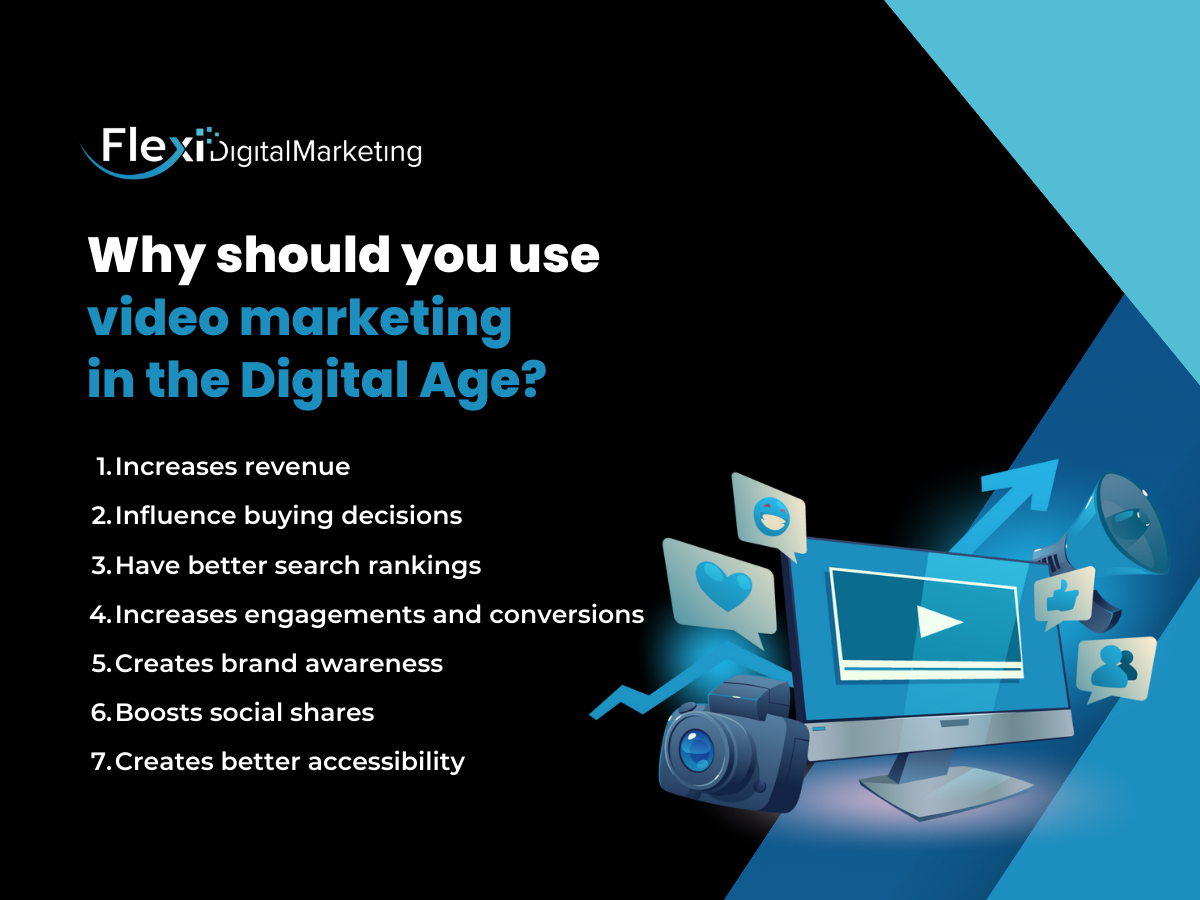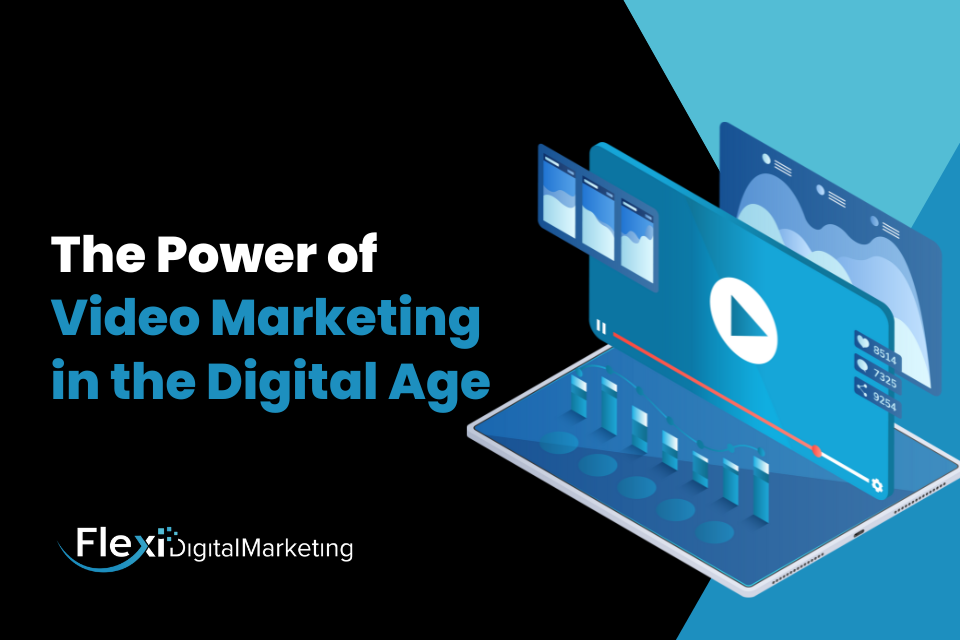The digital marketing landscape is constantly growing, with the market expected to grow by USD 786 in 2026. With that said – various strategies and trends have been emerging lately. One in particular is video marketing.
Lately, video marketing has evolved into a dominant force, driving engagement in a company. As users' attention spans dwindle, businesses turn to video marketing to captivate audiences and maintain engagement effectively.
So, in this article, we will delve into the transformative impact of video content in digital advertising, where innovation, storytelling, and technology converge to shape the future of digital advertising.
What is video marketing?
Video marketing is a powerful digital marketing trend and tool businesses use to promote their products or services through engaging visual content. It involves creating and sharing videos across various platforms, such as social media, websites, and email campaigns. These videos can take different forms. Video marketing examples may include product demos, customer testimonials, educational content, or entertaining stories.
The key objective of video marketing is to capture the viewer's attention and deliver a compelling message that resonates with the target audience. Through it, businesses can create memorable experiences that leave a lasting impact on viewers.
Why should you use video marketing?
In today's digital age, video marketing has become essential to any successful marketing strategy. It enables businesses to connect with their target audience on a deeper level by utilising captivating visuals and compelling storytelling. Through video marketing, companies can enhance brand awareness, engage customers meaningfully, and ultimately drive conversions for your business.
Likewise, here are the benefits of using video marketing:

Increases revenue
The correlation between video marketing and revenue growth is undeniable. Businesses that harness the power of video experience higher conversion rates and increased sales. An astonishing 90% of companies have indicated that video marketing played a pivotal role in lead generation, with 87% noting a boost in sales as a direct result of their video marketing endeavours.
Video engages auditory and visual senses, creating a more immersive experience for the viewer. This engagement is a crucial factor in influencing potential customers to act. Whether showcasing product features, demonstrating usage, or providing testimonials, video content helps build trust and confidence in your brand, leading to a significant boost in revenue.
Influence buying decisions
The human brain processes visual information faster than text, and video marketing leverages this fact to influence buying decisions effectively. A well-crafted video can evoke emotions, tell a compelling story, and connect the brand and the consumer.
Testimonials, reviews, and demonstrations presented in video format offer a more authentic and personal touch than traditional advertising. Prospective buyers are more likely to be swayed by a video showcasing a product's or service's benefits and real-world applications.
Have better search rankings.
Search engines, especially Google, prioritise video content in search results. Websites with video are 53 times more likely to rank on the first page of Google. This preference for video content is due to its ability to keep visitors on a webpage longer, reduce bounce rates, and signal to search engines that the content is valuable.
Optimising videos for search engines by incorporating relevant keywords, creating descriptive titles, and using accurate tags can significantly enhance your online visibility. With the increasing popularity of video content, businesses that embrace video marketing gain a competitive edge in search engine rankings.
Increases engagements and conversions
Engagement is a crucial metric in digital marketing, and video content captures and maintains audience attention. Videos generate more comments, shares, and likes than other content types. The interactive nature of video content facilitates two-way communication, allowing brands to connect with their audience on a deeper level.
Moreover, the potential for conversion is higher with video marketing. A well-crafted video can guide viewers through the sales funnel, providing information, addressing concerns, and ultimately leading them toward making a purchase. Combining visual and auditory stimuli creates a memorable experience that resonates with the audience, increasing the likelihood of converting leads into customers.
Creates brand awareness
Building brand awareness is a fundamental aspect of any marketing strategy, and video marketing is a powerful tool in achieving this goal. Through storytelling, brand messaging, and visual aesthetics, videos leave a lasting impression on viewers, fostering brand recall.
Videos offer an opportunity to showcase the personality and values of a brand, making it more relatable to the target audience. Whether through educational content, behind-the-scenes glimpses, or narrative-driven advertisements, videos contribute to shaping a positive perception of the brand in the minds of consumers.
Boosts social shares
In the era of social media dominance, the shareability of content is a crucial factor for its success. Video content is inherently shareable, and social media platforms actively prioritise and promote videos in users' feeds.
When viewers find a video interesting, informative, or entertaining, they are more likely to share it with their network, exponentially expanding the reach of the content. This organic sharing increases brand visibility and enhances credibility, as recommendations from friends and connections are often more trusted than traditional advertising.
Creates better accessibility
Accessibility is a crucial consideration in today's diverse and inclusive digital landscape. When properly optimised, video content can be more accessible than other forms of media. Captions, transcripts, and audio descriptions make videos accessible to individuals with disabilities, ensuring your message reaches a broader audience.
Additionally, the convenience of consuming video content on various devices and platforms enhances accessibility. Viewers on desktops, laptops, smartphones, or tablets can easily engage with video content, making it a versatile and user-friendly medium.
How do you start your video marketing campaign?
Starting a video marketing campaign involves careful planning and execution. Here is a step-by-step guide to help you launch a successful video marketing campaign:
Define Your Goals
Goals are essential in any marketing campaign. It helps you prioritise tasks, clarify information, clear focus, and increase productivity. In video marketing, goals are not only essential but also critical elements. It ascertains what your campaign, videos, and other content will contain. It will determine whether your campaign will succeed or not.
As such, clearly outline the objectives of your video marketing campaign. Whether it's increasing brand awareness, driving website traffic, generating leads, or boosting sales, having specific goals will guide the content creation and overall strategy.
Know Your Target Audience
Knowing your target audience is essential in video marketing. This element ensures that your videos resonate with your target audience. By knowing your audiences, you will also know their interests, pain points, and behaviours. This will help you create relevant, personalised, and engaging content for your audiences. Likewise, it will also ensure that your content will reach the right people.
Identify your target audience and understand their preferences, interests, and behaviours. Tailor your video content to resonate with this audience, ensuring your message is relevant and compelling to the people you want to reach.
Choose the Right Platforms
Audience is the most essential element in every marketing content. And in video marketing, choosing the right platform is critical in reaching the right audiences.
Likewise, select the platforms where your target audience is most active. Whether it's YouTube, Facebook, Instagram, LinkedIn, or other channels, align your video content with the platform's format and audience expectations.
Craft Compelling Content
Content is significant in video marketing. The success of a video marketing campaign often hinges on the quality and relevance of the content you create.
As such, remember to develop a content strategy that aligns with your goals and resonates with your audience. Create videos that tell a story, evoke emotions, or provide value. Consider different formats such as tutorials, behind-the-scenes glimpses, customer testimonials, or product demonstrations.
Invest in Quality Production
Investing in decent production quality is essential, while you don't need a Hollywood-level budget. Try to use good lighting, clear audio, and high-resolution visuals. Quality production contributes to a more professional and engaging viewer experience.
Create a Content Calendar
As mentioned, content is critical in video marketing. As such, having a content calendar can be beneficial to your campaign. It will help with planning and provide structure, strategy, and organisation to your overall efforts.
Likewise, develop a content calendar outlining the release schedule for your videos. Consistency is key, so plan regular releases to keep your audience engaged. This calendar should also consider any seasonality or timely events relevant to your business.
Optimise for SEO
Understanding and implementing SEO principles in video content enhances visibility and ensures that your videos reach and engage the right audience. If using platforms like YouTube or your website, optimise your videos for search engines. Use relevant keywords in video titles, descriptions, and tags to improve discoverability. A well-optimised video is more likely to appear in search results.
Promote Across Channels
Leverage your existing marketing channels to promote your video content. Share videos on social media, embed them in email campaigns and consider collaborations with influencers or partners to expand your reach.
Measure and Analyse
Utilise analytics tools to track the performance of your videos. Monitor views, watch time, engagement, and conversion rates. Analysing data will provide insights into what works and help you refine your strategy for future campaigns.
Iterate and Improve
Based on the analytics and feedback, iterate on your video marketing strategy. Continuously refine your approach, experiment with different content types, and adapt to the evolving preferences of your audience.
Conclusion
In conclusion, the power of video has emerged as a transformative force, reshaping how businesses connect with their audience. However, harnessing its potential requires expertise and strategic guidance. To unlock the full power of video marketing in the digital age, entrust your endeavours to professionals who understand the nuances of this dynamic medium.
At Flexi Digital Marketing, we craft compelling video strategies tailored to elevate your brand and engage your audience. Our team of experienced experts is dedicated to delivering impactful and results-driven video marketing solutions. Let us be your partners in navigating the exciting realm of video marketing, propelling your brand to new heights.


